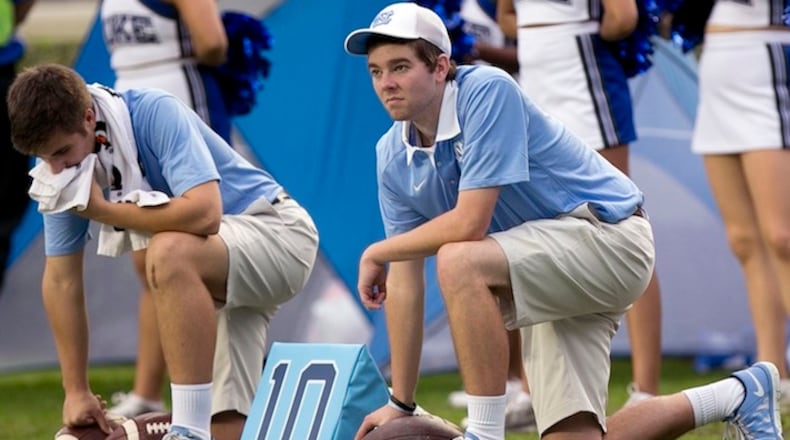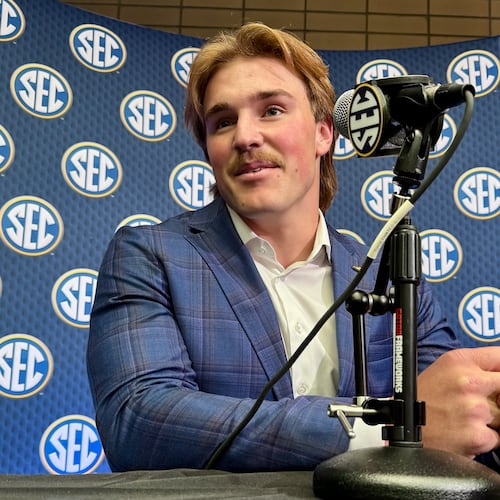Layton Smith didn't end up on the wrong sideline in his N.C. State gear by accident. He was born to it. He grew up riding in the equipment semi-trailer to road games with his uncle, who drove it. When he arrived at N.C. State, he became a student manager. And on Saturdays, just before the game starts, he walks across the field to the opposing sideline.
Smith has one of the strangest and least-noticed jobs in college football, if not all of sports: The ballboys who work on the opposite sideline among the opposing players and coaches while their team is on offense, playing underhand toss with the officials, rotating the game balls in and out of action, pilgrims in an unholy land.
"You have to get used to the fact that you don't have any friends over there," Smith said, "so you have to be even more professional than anyone else. ... We're athletes and we're there to do a job and if we don't do our job, the game doesn't run smoothly."
"Running balls" is typically an entry-level job for student managers, but some enjoy it so much they do it for their entire college career _ especially those who end up working the other sideline. Smith, a senior, does it all the time for N.C. State. Sophomore Patrick Kearney rotates back and forth. Some prefer it. Others tolerate it.
Smith, from Apex, N.C., considers this job his birthright. The Wolfpack's Kearney, who played football at Broughton, considered Division III college football but decided he'd rather be at N.C. State. North Carolina's Joe Sojka, a junior from Laurinburg, N.C., saw a flier in a dining hall and signed up. Evan Mozingo, a sophomore at UNC, got the job because his aunt is friends with the Tar Heels' equipment manager.
Duke's Clark Gustafson went to Broughton with Kearney, and also goes to N.C. State with Kearney. But he grew up a Duke fan and for four years has gotten up at 6:30 every morning during football season to commute to Durham before he returns to Raleigh to go to class.
"When we're over there we know we're isolated," said Gustafson, who typically spends one half on each sideline. "We're on their turf."
Unlike the NFL, where both teams play with the same set of game balls, each college team plays with its own, examined and approved by the officials beforehand but distributed and administered by that team during the game. Each team has one or two on both sidelines, even the opposing sideline, behind enemy lines.
In a sport where control-freak coaches obsess over the smallest details, obfuscating injuries and using decoy play signals, members of the opposition stand among them at all times, an enduring anachronism in the paranoid, parochial world of college football.
"I hate it," North Carolina coach Larry Fedora said. "It's part of the game but they're always standing right there. ... They're always in the opposing team's colors. That bothers me, too."
___
'An enemy in their camp'
This strange operation exists because there's no way to run the game smoothly without it. When an official spots a ball outside the hashmarks, that ball is tossed to the sideline and a new ball is tossed to the officials in the defensive backfield, who then toss it down the middle of the field to the umpire to spot on the hashmark. That requires one or two ballboys from both teams on both sidelines.
Mozingo grew up a North Carolina fan in Concord, N.C., and like many freshman managers, running balls was his first game-day assignment last season. He went to the opposing sideline for the first time at Notre Dame, which isn't exactly jumping into the shallow end of the pool.
He had many of the same questions about the job any fan would have.
"Honestly, I don't know what they're going to say to me. Am I an enemy in their camp, kind of thing? Or is it something they're used to?" Mozingo said. "But every team has opposing ballboys on their side. I had interacted with ballboys on our side beforehand, in previous games, so I realized it's not that big a deal. But at the same time, every team is different. You don't know what to expect."
Mozingo's nervousness was misplaced; not only are teams used to seeing the opposing ballboys on their sideline, they always have a few of their own on the other sideline, essentially an exchange of hostages _ "negotiators," as they called them in "The Godfather." Issues and incidents are rare, although they do occur.
N.C. State coach Dave Doeren wrote a letter of apology to a Duke manager who complained of State players verbally abusing him two years ago, and Louisville coach Bobby Petrino in October accused State managers of spying on his team and tried to remove them from his sideline. ("Any issues we had on game day were addressed with appropriate parties," a Louisville spokesman wrote in an email.)
"I have never overly worried about that," Duke coach David Cutcliffe said. "That should be considered a good part of the game. That's that kid who can't play who wants to be part of something."
Managers say there's too much going on to relay signals or information to the opposing sideline, even at halftime. There's also a code of ethics that applies to ballboys in this unique role: No cheering, no spying, no getting in the way, pay attention.
Quiet, attentive, out of the way
Some of this is obvious. Minimal celebration is tolerated _ after all, you are clearly part of the opposition _ but nothing too blatant.
"You've got to keep it together over there," Sojka said. "A big play, you might give it a little fist pump."
Not getting in the way is tougher. The job requires access to the sideline and the officials, often at times coaches are trying to communicate with the defense and substitutions are streaming on and off the field.
"I've run into them, definitely, but I've never knocked one over or anything like that," Fedora said. "I'm not real polite on the sideline. I don't even recognize who it is a lot of the time."
Paying attention sounds obvious, but it's easy to get caught up in the flow of the game and suddenly notice an official trying to get your attention. A slow or inattentive ballboy can inadvertently hamper the pace of play, no small consideration in this era of hurry-up offenses.
"You want a thinker who's paying attention and not looking around," said former ACC officiating supervisor Doug Rhoads, who in 29 years as a back judge tossed countless footballs back and forth with each team's managers. "It's critical they do a good job, because it doesn't take much to screw up a good game if they're not paying attention and balls are late coming in."
Then there's spying, the crime Petrino accused N.C. State of perpetrating. Not only is there an unwritten rule against signaling the other sideline or relaying information at halftime, it's often an intellectual and logistical impossibility anyway.
"Obviously you do end up hearing things," Gustafson said. "I play Madden, but I'm not intelligent enough to really interpret. They might call one play and I have no clue what it means. I couldn't translate if I wanted to. ... Even if I heard they were doing a fake punt, it wouldn't cross my mind to try and get it over there, "Hey, they're doing a fake punt." I'm over there to make the game run smoothly, not to give Duke an advantage in the game."
___
'The best seat'
If anything, there's more contact with the opposing team than their own. North Carolina's Ryan Switzer debated a 50-50 pass-interference call with a Wake Forest manager on the Tar Heels' sideline last month while the officials conferred. A week later, N.C. State's Smith was relaxing at the back of the Wake Forest sideline while the Deacons were on offense when defensive back James Ward walked up and asked to see one of N.C. State's balls, inspecting it for differences.
That's something North Carolina quarterback Marquise Williams likes to do, see how opposing quarterbacks like their game balls prepared.
"I'm just an open guy," Williams said. "I want to give them some love. They're doing a great job for the opposing team."
Every manager has some kind of story like that. There was the fourth quarter of a 56-20 loss to Clemson during Gustafson's freshman year, when the Tigers' starters weren't exactly focused on football.
"DeAndre Hopkins came up to me and asked me what Duke basketball games are like," Gustafson said. "I'm holding back my tears how bad we're losing, and Hopkins and Tajh Boyd are asking me if I know any cheerleaders."
North Carolina played at Miami on the night the Hurricanes honored Jim Kelly. When Kelly walked over to the Miami sideline, Sojka and another UNC ballboy were the only people there.
"We were pretty close to him and he looked at us and said, "Y'all are on the wrong sideline. What are y'all doing over here?' " Sojka said. "We kind of laughed it off, like just part of the job."
Kearney remembers taking a knee near the goal line with another manager at Old Dominion earlier this season, as N.C. State was about to score yet another touchdown. He turned to him and said, "We do a lot of work and the hours are pretty terrible sometimes, but this all makes it worth it, having the greatest vantage point in the world for the team that I've grown up loving since I was 3."
"If it was up to me, I'd stay here and run balls for all four years," Mozingo said. "I love it. You've got the best seat in the house. You're right there on the white by the referees. Coaches get out of your way. It's a lot of fun. It's a great experience."
About the Author
Keep Reading
The Latest
Featured


